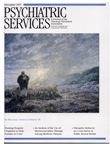Family Caregivers' Criticism of Patients With Schizophrenia
Abstract
OBJECTIVE: Relationships were examined between patients' negative symptoms, family caregivers' knowledge of schizophrenia, caregivers' attributions about the cause of patients' symptoms, and caregivers' response to the symptoms. METHODS: A sample of 84 caregivers of patients with schizophrenia in Brisbane, Australia, were interviewed using a structured format and measures designed for the study. RESULTS: Results of regression analyses indicated that three variables significantly predicted caregivers' criticism of patients—a smaller proportion of negative symptoms in the patient's overall symptom pattern, the caregiver's low level of knowledge about the illness, and the caregiver's attributing the cause of negative symptoms to the patient's personality rather than to the illness. CONCLUSIONS: Overall, findings supported the utility of an attributional framework in enhancing conceptions about and research on schizophrenia and family caregiving.



